Case Study on Contract Law: Exploring Unilateral Contracts & Remedies
VerifiedAdded on 2023/06/04
|8
|2260
|377
Case Study
AI Summary
This case study analyzes two distinct scenarios related to contract law. The first scenario examines the formation of a unilateral contract, focusing on whether a valid agreement exists between Leila, who offered a reward for the return of her lost gold chain and locket, and Julie, who found and returned the items. The analysis considers the elements of a unilateral contract, referencing relevant case law such as Carlill v Carbolic Smokeball Co. The second scenario addresses the remedies available to Adam following Edwin's breach of contract for the sale of a vintage Rolls-Royce. The discussion covers various remedies, including damages and specific performance, citing cases like Lumley v. Wagner to illustrate the court's approach to enforcing contracts. The study concludes by recommending potential actions for Julie and Adam, considering the legal principles and precedents discussed. Desklib offers a wealth of similar solved assignments and study resources for students.

1
Student Name:
Date:
Institution:
Student Name:
Date:
Institution:
Paraphrase This Document
Need a fresh take? Get an instant paraphrase of this document with our AI Paraphraser
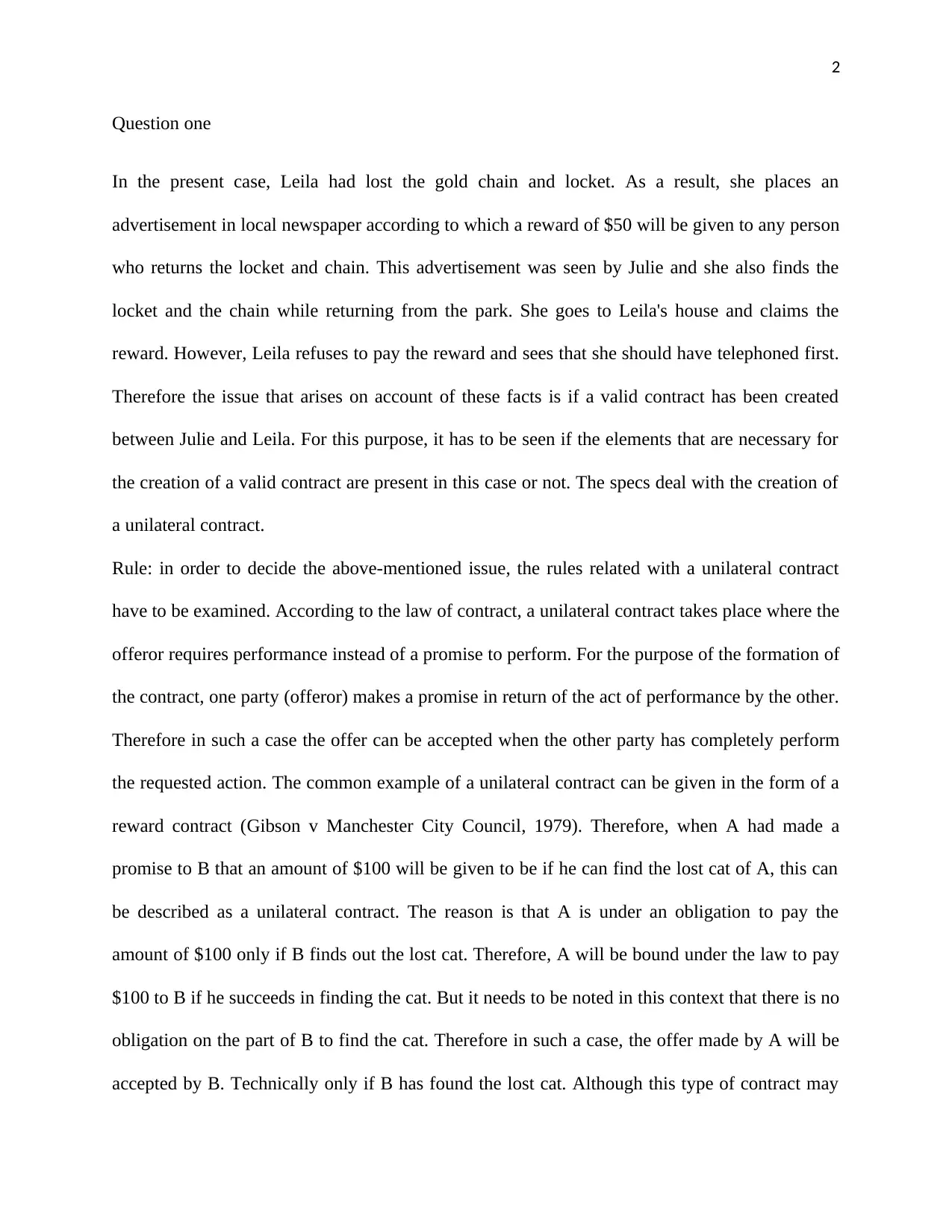
2
Question one
In the present case, Leila had lost the gold chain and locket. As a result, she places an
advertisement in local newspaper according to which a reward of $50 will be given to any person
who returns the locket and chain. This advertisement was seen by Julie and she also finds the
locket and the chain while returning from the park. She goes to Leila's house and claims the
reward. However, Leila refuses to pay the reward and sees that she should have telephoned first.
Therefore the issue that arises on account of these facts is if a valid contract has been created
between Julie and Leila. For this purpose, it has to be seen if the elements that are necessary for
the creation of a valid contract are present in this case or not. The specs deal with the creation of
a unilateral contract.
Rule: in order to decide the above-mentioned issue, the rules related with a unilateral contract
have to be examined. According to the law of contract, a unilateral contract takes place where the
offeror requires performance instead of a promise to perform. For the purpose of the formation of
the contract, one party (offeror) makes a promise in return of the act of performance by the other.
Therefore in such a case the offer can be accepted when the other party has completely perform
the requested action. The common example of a unilateral contract can be given in the form of a
reward contract (Gibson v Manchester City Council, 1979). Therefore, when A had made a
promise to B that an amount of $100 will be given to be if he can find the lost cat of A, this can
be described as a unilateral contract. The reason is that A is under an obligation to pay the
amount of $100 only if B finds out the lost cat. Therefore, A will be bound under the law to pay
$100 to B if he succeeds in finding the cat. But it needs to be noted in this context that there is no
obligation on the part of B to find the cat. Therefore in such a case, the offer made by A will be
accepted by B. Technically only if B has found the lost cat. Although this type of contract may
Question one
In the present case, Leila had lost the gold chain and locket. As a result, she places an
advertisement in local newspaper according to which a reward of $50 will be given to any person
who returns the locket and chain. This advertisement was seen by Julie and she also finds the
locket and the chain while returning from the park. She goes to Leila's house and claims the
reward. However, Leila refuses to pay the reward and sees that she should have telephoned first.
Therefore the issue that arises on account of these facts is if a valid contract has been created
between Julie and Leila. For this purpose, it has to be seen if the elements that are necessary for
the creation of a valid contract are present in this case or not. The specs deal with the creation of
a unilateral contract.
Rule: in order to decide the above-mentioned issue, the rules related with a unilateral contract
have to be examined. According to the law of contract, a unilateral contract takes place where the
offeror requires performance instead of a promise to perform. For the purpose of the formation of
the contract, one party (offeror) makes a promise in return of the act of performance by the other.
Therefore in such a case the offer can be accepted when the other party has completely perform
the requested action. The common example of a unilateral contract can be given in the form of a
reward contract (Gibson v Manchester City Council, 1979). Therefore, when A had made a
promise to B that an amount of $100 will be given to be if he can find the lost cat of A, this can
be described as a unilateral contract. The reason is that A is under an obligation to pay the
amount of $100 only if B finds out the lost cat. Therefore, A will be bound under the law to pay
$100 to B if he succeeds in finding the cat. But it needs to be noted in this context that there is no
obligation on the part of B to find the cat. Therefore in such a case, the offer made by A will be
accepted by B. Technically only if B has found the lost cat. Although this type of contract may
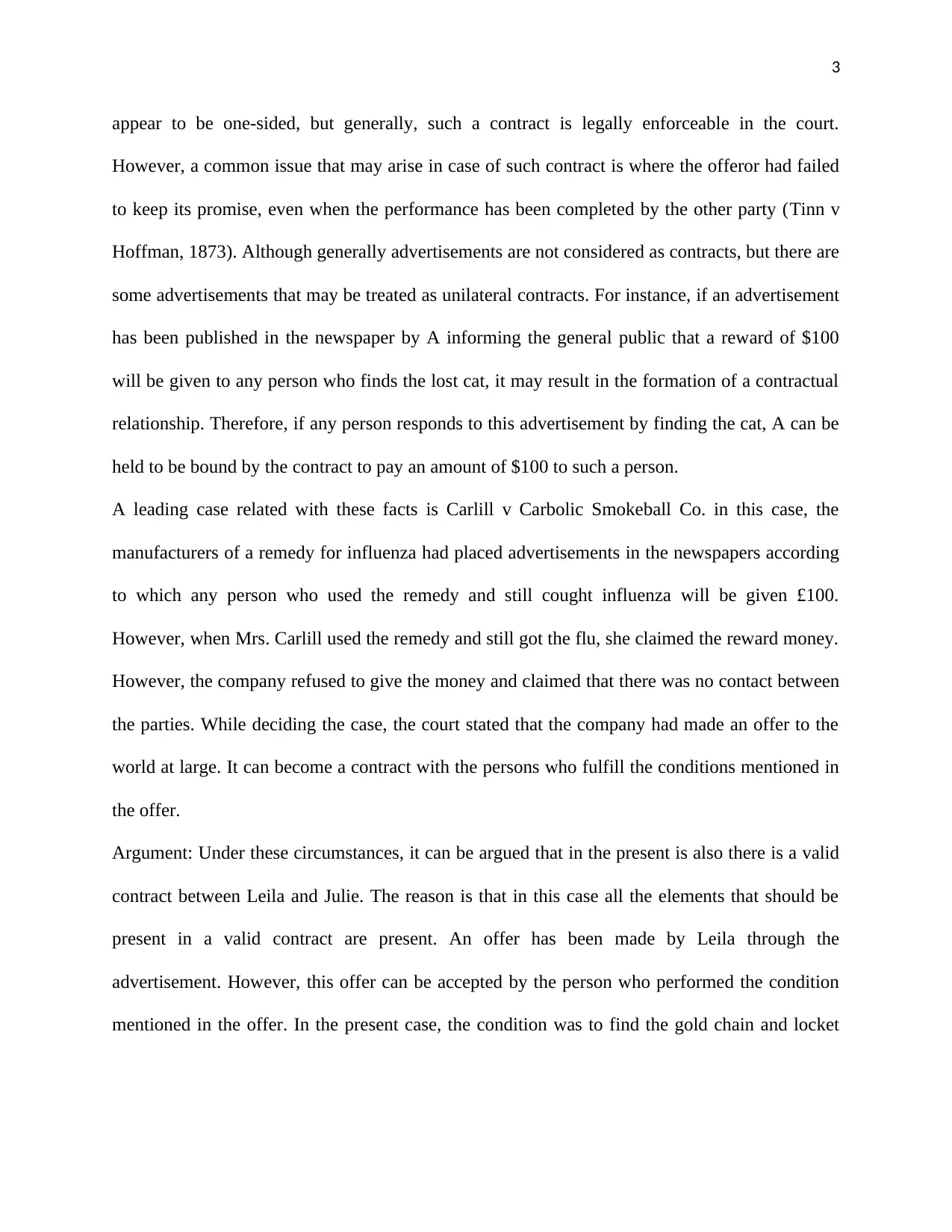
3
appear to be one-sided, but generally, such a contract is legally enforceable in the court.
However, a common issue that may arise in case of such contract is where the offeror had failed
to keep its promise, even when the performance has been completed by the other party (Tinn v
Hoffman, 1873). Although generally advertisements are not considered as contracts, but there are
some advertisements that may be treated as unilateral contracts. For instance, if an advertisement
has been published in the newspaper by A informing the general public that a reward of $100
will be given to any person who finds the lost cat, it may result in the formation of a contractual
relationship. Therefore, if any person responds to this advertisement by finding the cat, A can be
held to be bound by the contract to pay an amount of $100 to such a person.
A leading case related with these facts is Carlill v Carbolic Smokeball Co. in this case, the
manufacturers of a remedy for influenza had placed advertisements in the newspapers according
to which any person who used the remedy and still cought influenza will be given £100.
However, when Mrs. Carlill used the remedy and still got the flu, she claimed the reward money.
However, the company refused to give the money and claimed that there was no contact between
the parties. While deciding the case, the court stated that the company had made an offer to the
world at large. It can become a contract with the persons who fulfill the conditions mentioned in
the offer.
Argument: Under these circumstances, it can be argued that in the present is also there is a valid
contract between Leila and Julie. The reason is that in this case all the elements that should be
present in a valid contract are present. An offer has been made by Leila through the
advertisement. However, this offer can be accepted by the person who performed the condition
mentioned in the offer. In the present case, the condition was to find the gold chain and locket
appear to be one-sided, but generally, such a contract is legally enforceable in the court.
However, a common issue that may arise in case of such contract is where the offeror had failed
to keep its promise, even when the performance has been completed by the other party (Tinn v
Hoffman, 1873). Although generally advertisements are not considered as contracts, but there are
some advertisements that may be treated as unilateral contracts. For instance, if an advertisement
has been published in the newspaper by A informing the general public that a reward of $100
will be given to any person who finds the lost cat, it may result in the formation of a contractual
relationship. Therefore, if any person responds to this advertisement by finding the cat, A can be
held to be bound by the contract to pay an amount of $100 to such a person.
A leading case related with these facts is Carlill v Carbolic Smokeball Co. in this case, the
manufacturers of a remedy for influenza had placed advertisements in the newspapers according
to which any person who used the remedy and still cought influenza will be given £100.
However, when Mrs. Carlill used the remedy and still got the flu, she claimed the reward money.
However, the company refused to give the money and claimed that there was no contact between
the parties. While deciding the case, the court stated that the company had made an offer to the
world at large. It can become a contract with the persons who fulfill the conditions mentioned in
the offer.
Argument: Under these circumstances, it can be argued that in the present is also there is a valid
contract between Leila and Julie. The reason is that in this case all the elements that should be
present in a valid contract are present. An offer has been made by Leila through the
advertisement. However, this offer can be accepted by the person who performed the condition
mentioned in the offer. In the present case, the condition was to find the gold chain and locket
⊘ This is a preview!⊘
Do you want full access?
Subscribe today to unlock all pages.

Trusted by 1+ million students worldwide
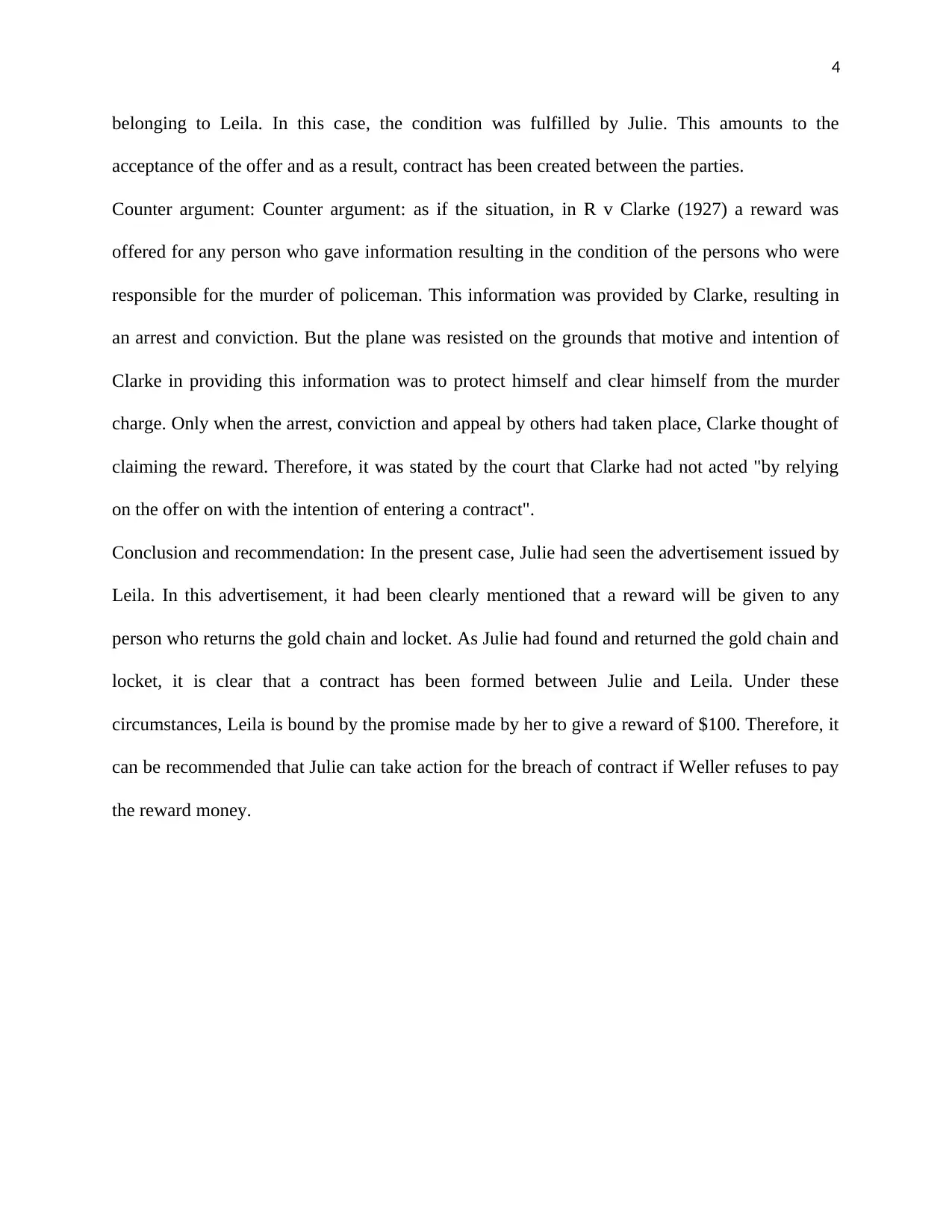
4
belonging to Leila. In this case, the condition was fulfilled by Julie. This amounts to the
acceptance of the offer and as a result, contract has been created between the parties.
Counter argument: Counter argument: as if the situation, in R v Clarke (1927) a reward was
offered for any person who gave information resulting in the condition of the persons who were
responsible for the murder of policeman. This information was provided by Clarke, resulting in
an arrest and conviction. But the plane was resisted on the grounds that motive and intention of
Clarke in providing this information was to protect himself and clear himself from the murder
charge. Only when the arrest, conviction and appeal by others had taken place, Clarke thought of
claiming the reward. Therefore, it was stated by the court that Clarke had not acted "by relying
on the offer on with the intention of entering a contract".
Conclusion and recommendation: In the present case, Julie had seen the advertisement issued by
Leila. In this advertisement, it had been clearly mentioned that a reward will be given to any
person who returns the gold chain and locket. As Julie had found and returned the gold chain and
locket, it is clear that a contract has been formed between Julie and Leila. Under these
circumstances, Leila is bound by the promise made by her to give a reward of $100. Therefore, it
can be recommended that Julie can take action for the breach of contract if Weller refuses to pay
the reward money.
belonging to Leila. In this case, the condition was fulfilled by Julie. This amounts to the
acceptance of the offer and as a result, contract has been created between the parties.
Counter argument: Counter argument: as if the situation, in R v Clarke (1927) a reward was
offered for any person who gave information resulting in the condition of the persons who were
responsible for the murder of policeman. This information was provided by Clarke, resulting in
an arrest and conviction. But the plane was resisted on the grounds that motive and intention of
Clarke in providing this information was to protect himself and clear himself from the murder
charge. Only when the arrest, conviction and appeal by others had taken place, Clarke thought of
claiming the reward. Therefore, it was stated by the court that Clarke had not acted "by relying
on the offer on with the intention of entering a contract".
Conclusion and recommendation: In the present case, Julie had seen the advertisement issued by
Leila. In this advertisement, it had been clearly mentioned that a reward will be given to any
person who returns the gold chain and locket. As Julie had found and returned the gold chain and
locket, it is clear that a contract has been formed between Julie and Leila. Under these
circumstances, Leila is bound by the promise made by her to give a reward of $100. Therefore, it
can be recommended that Julie can take action for the breach of contract if Weller refuses to pay
the reward money.
Paraphrase This Document
Need a fresh take? Get an instant paraphrase of this document with our AI Paraphraser
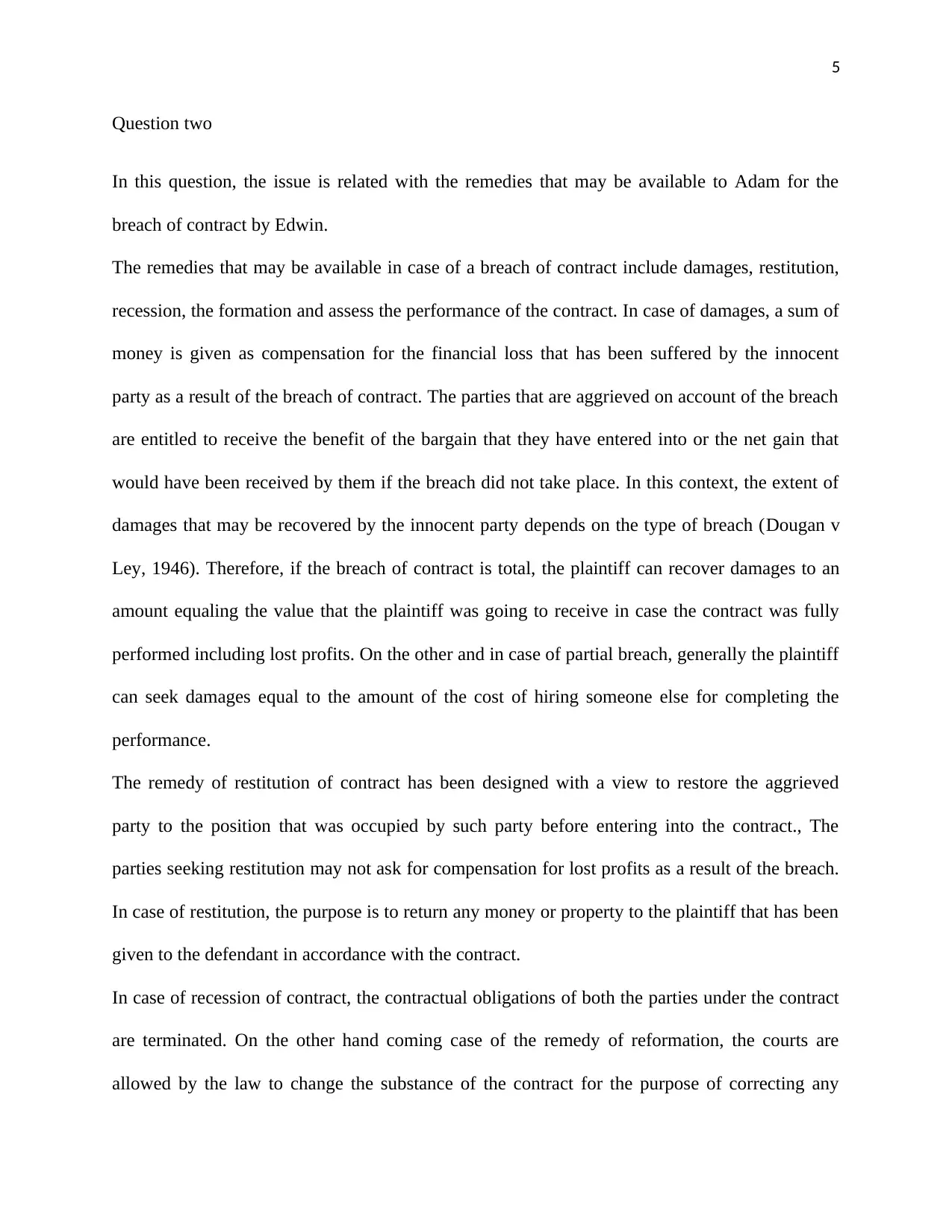
5
Question two
In this question, the issue is related with the remedies that may be available to Adam for the
breach of contract by Edwin.
The remedies that may be available in case of a breach of contract include damages, restitution,
recession, the formation and assess the performance of the contract. In case of damages, a sum of
money is given as compensation for the financial loss that has been suffered by the innocent
party as a result of the breach of contract. The parties that are aggrieved on account of the breach
are entitled to receive the benefit of the bargain that they have entered into or the net gain that
would have been received by them if the breach did not take place. In this context, the extent of
damages that may be recovered by the innocent party depends on the type of breach (Dougan v
Ley, 1946). Therefore, if the breach of contract is total, the plaintiff can recover damages to an
amount equaling the value that the plaintiff was going to receive in case the contract was fully
performed including lost profits. On the other and in case of partial breach, generally the plaintiff
can seek damages equal to the amount of the cost of hiring someone else for completing the
performance.
The remedy of restitution of contract has been designed with a view to restore the aggrieved
party to the position that was occupied by such party before entering into the contract., The
parties seeking restitution may not ask for compensation for lost profits as a result of the breach.
In case of restitution, the purpose is to return any money or property to the plaintiff that has been
given to the defendant in accordance with the contract.
In case of recession of contract, the contractual obligations of both the parties under the contract
are terminated. On the other hand coming case of the remedy of reformation, the courts are
allowed by the law to change the substance of the contract for the purpose of correcting any
Question two
In this question, the issue is related with the remedies that may be available to Adam for the
breach of contract by Edwin.
The remedies that may be available in case of a breach of contract include damages, restitution,
recession, the formation and assess the performance of the contract. In case of damages, a sum of
money is given as compensation for the financial loss that has been suffered by the innocent
party as a result of the breach of contract. The parties that are aggrieved on account of the breach
are entitled to receive the benefit of the bargain that they have entered into or the net gain that
would have been received by them if the breach did not take place. In this context, the extent of
damages that may be recovered by the innocent party depends on the type of breach (Dougan v
Ley, 1946). Therefore, if the breach of contract is total, the plaintiff can recover damages to an
amount equaling the value that the plaintiff was going to receive in case the contract was fully
performed including lost profits. On the other and in case of partial breach, generally the plaintiff
can seek damages equal to the amount of the cost of hiring someone else for completing the
performance.
The remedy of restitution of contract has been designed with a view to restore the aggrieved
party to the position that was occupied by such party before entering into the contract., The
parties seeking restitution may not ask for compensation for lost profits as a result of the breach.
In case of restitution, the purpose is to return any money or property to the plaintiff that has been
given to the defendant in accordance with the contract.
In case of recession of contract, the contractual obligations of both the parties under the contract
are terminated. On the other hand coming case of the remedy of reformation, the courts are
allowed by the law to change the substance of the contract for the purpose of correcting any
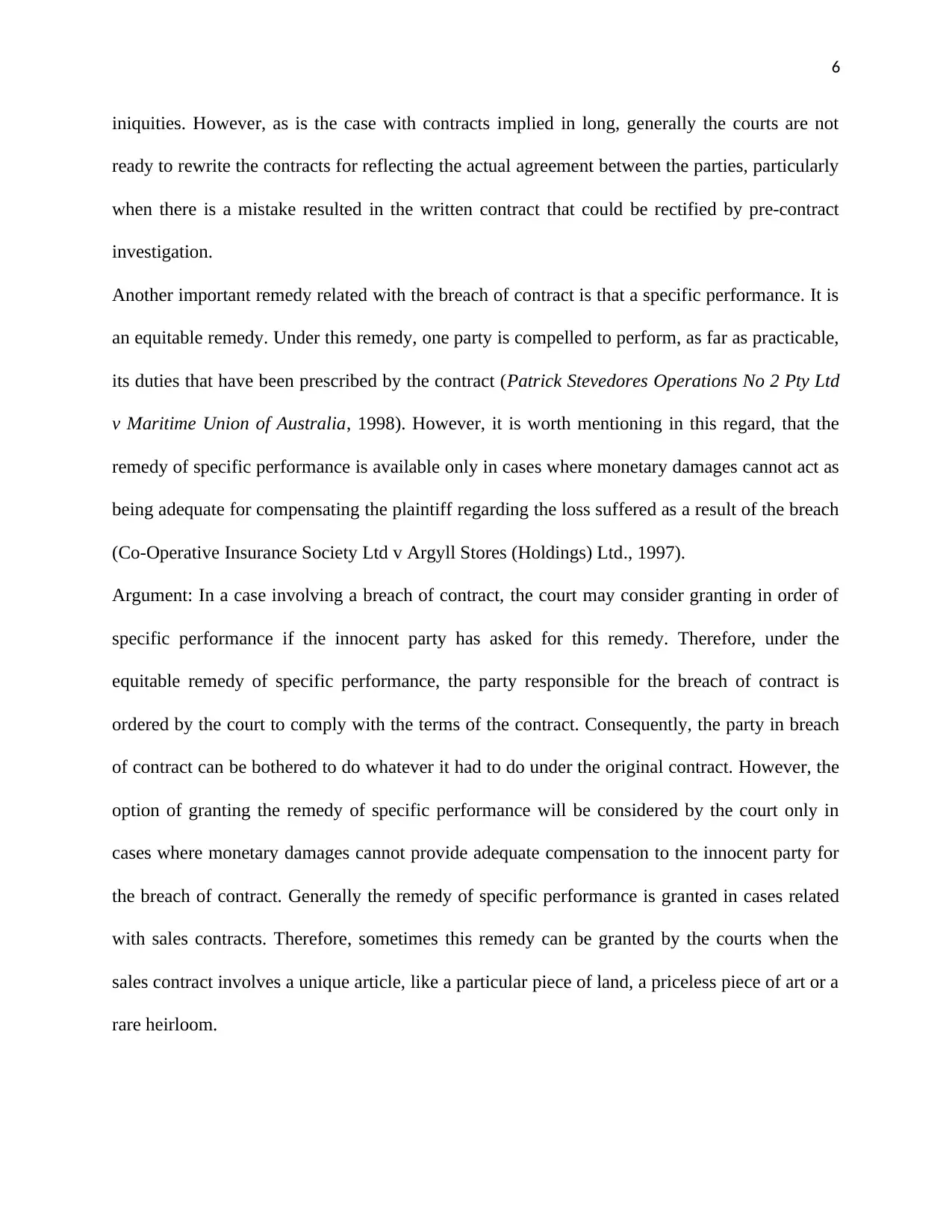
6
iniquities. However, as is the case with contracts implied in long, generally the courts are not
ready to rewrite the contracts for reflecting the actual agreement between the parties, particularly
when there is a mistake resulted in the written contract that could be rectified by pre-contract
investigation.
Another important remedy related with the breach of contract is that a specific performance. It is
an equitable remedy. Under this remedy, one party is compelled to perform, as far as practicable,
its duties that have been prescribed by the contract (Patrick Stevedores Operations No 2 Pty Ltd
v Maritime Union of Australia, 1998). However, it is worth mentioning in this regard, that the
remedy of specific performance is available only in cases where monetary damages cannot act as
being adequate for compensating the plaintiff regarding the loss suffered as a result of the breach
(Co-Operative Insurance Society Ltd v Argyll Stores (Holdings) Ltd., 1997).
Argument: In a case involving a breach of contract, the court may consider granting in order of
specific performance if the innocent party has asked for this remedy. Therefore, under the
equitable remedy of specific performance, the party responsible for the breach of contract is
ordered by the court to comply with the terms of the contract. Consequently, the party in breach
of contract can be bothered to do whatever it had to do under the original contract. However, the
option of granting the remedy of specific performance will be considered by the court only in
cases where monetary damages cannot provide adequate compensation to the innocent party for
the breach of contract. Generally the remedy of specific performance is granted in cases related
with sales contracts. Therefore, sometimes this remedy can be granted by the courts when the
sales contract involves a unique article, like a particular piece of land, a priceless piece of art or a
rare heirloom.
iniquities. However, as is the case with contracts implied in long, generally the courts are not
ready to rewrite the contracts for reflecting the actual agreement between the parties, particularly
when there is a mistake resulted in the written contract that could be rectified by pre-contract
investigation.
Another important remedy related with the breach of contract is that a specific performance. It is
an equitable remedy. Under this remedy, one party is compelled to perform, as far as practicable,
its duties that have been prescribed by the contract (Patrick Stevedores Operations No 2 Pty Ltd
v Maritime Union of Australia, 1998). However, it is worth mentioning in this regard, that the
remedy of specific performance is available only in cases where monetary damages cannot act as
being adequate for compensating the plaintiff regarding the loss suffered as a result of the breach
(Co-Operative Insurance Society Ltd v Argyll Stores (Holdings) Ltd., 1997).
Argument: In a case involving a breach of contract, the court may consider granting in order of
specific performance if the innocent party has asked for this remedy. Therefore, under the
equitable remedy of specific performance, the party responsible for the breach of contract is
ordered by the court to comply with the terms of the contract. Consequently, the party in breach
of contract can be bothered to do whatever it had to do under the original contract. However, the
option of granting the remedy of specific performance will be considered by the court only in
cases where monetary damages cannot provide adequate compensation to the innocent party for
the breach of contract. Generally the remedy of specific performance is granted in cases related
with sales contracts. Therefore, sometimes this remedy can be granted by the courts when the
sales contract involves a unique article, like a particular piece of land, a priceless piece of art or a
rare heirloom.
⊘ This is a preview!⊘
Do you want full access?
Subscribe today to unlock all pages.

Trusted by 1+ million students worldwide
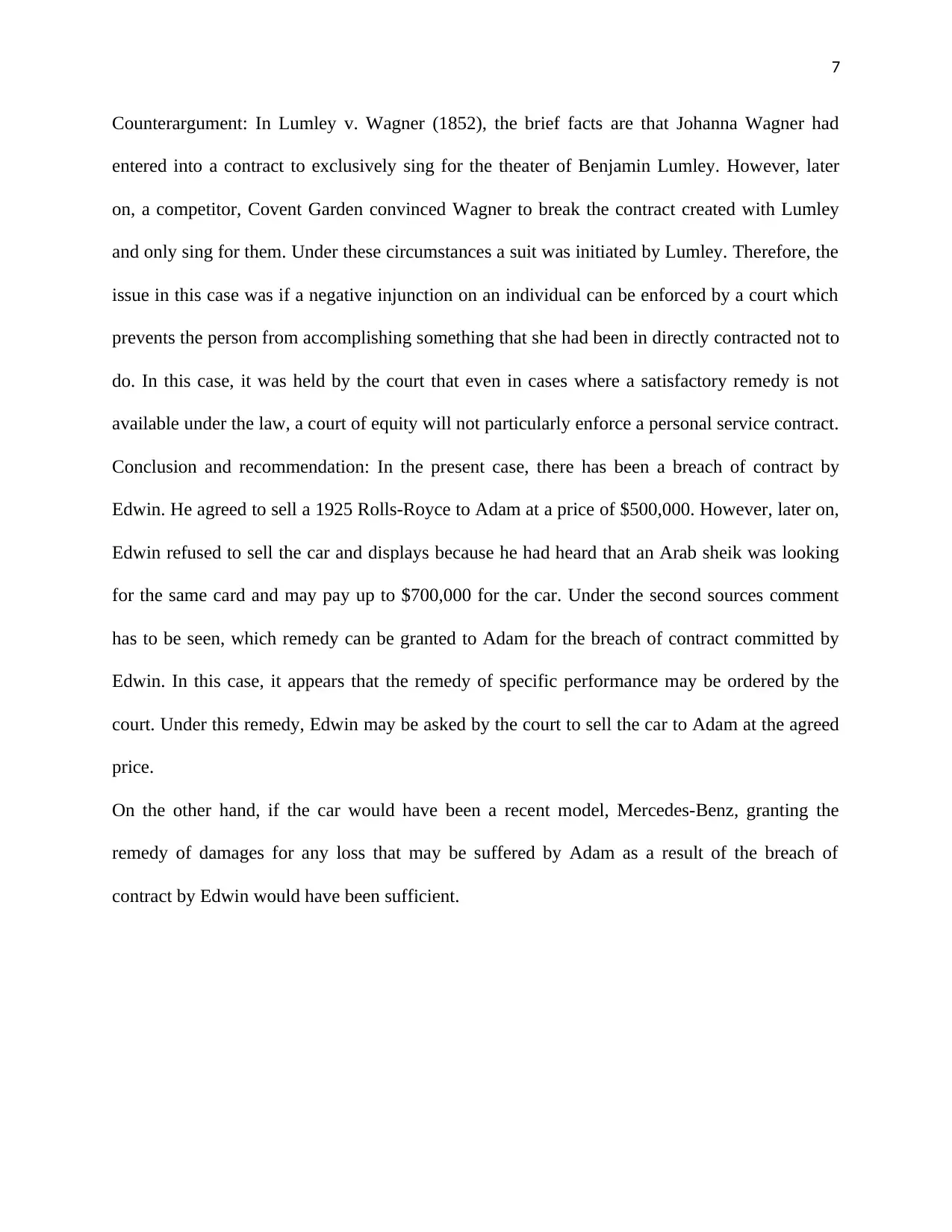
7
Counterargument: In Lumley v. Wagner (1852), the brief facts are that Johanna Wagner had
entered into a contract to exclusively sing for the theater of Benjamin Lumley. However, later
on, a competitor, Covent Garden convinced Wagner to break the contract created with Lumley
and only sing for them. Under these circumstances a suit was initiated by Lumley. Therefore, the
issue in this case was if a negative injunction on an individual can be enforced by a court which
prevents the person from accomplishing something that she had been in directly contracted not to
do. In this case, it was held by the court that even in cases where a satisfactory remedy is not
available under the law, a court of equity will not particularly enforce a personal service contract.
Conclusion and recommendation: In the present case, there has been a breach of contract by
Edwin. He agreed to sell a 1925 Rolls-Royce to Adam at a price of $500,000. However, later on,
Edwin refused to sell the car and displays because he had heard that an Arab sheik was looking
for the same card and may pay up to $700,000 for the car. Under the second sources comment
has to be seen, which remedy can be granted to Adam for the breach of contract committed by
Edwin. In this case, it appears that the remedy of specific performance may be ordered by the
court. Under this remedy, Edwin may be asked by the court to sell the car to Adam at the agreed
price.
On the other hand, if the car would have been a recent model, Mercedes-Benz, granting the
remedy of damages for any loss that may be suffered by Adam as a result of the breach of
contract by Edwin would have been sufficient.
Counterargument: In Lumley v. Wagner (1852), the brief facts are that Johanna Wagner had
entered into a contract to exclusively sing for the theater of Benjamin Lumley. However, later
on, a competitor, Covent Garden convinced Wagner to break the contract created with Lumley
and only sing for them. Under these circumstances a suit was initiated by Lumley. Therefore, the
issue in this case was if a negative injunction on an individual can be enforced by a court which
prevents the person from accomplishing something that she had been in directly contracted not to
do. In this case, it was held by the court that even in cases where a satisfactory remedy is not
available under the law, a court of equity will not particularly enforce a personal service contract.
Conclusion and recommendation: In the present case, there has been a breach of contract by
Edwin. He agreed to sell a 1925 Rolls-Royce to Adam at a price of $500,000. However, later on,
Edwin refused to sell the car and displays because he had heard that an Arab sheik was looking
for the same card and may pay up to $700,000 for the car. Under the second sources comment
has to be seen, which remedy can be granted to Adam for the breach of contract committed by
Edwin. In this case, it appears that the remedy of specific performance may be ordered by the
court. Under this remedy, Edwin may be asked by the court to sell the car to Adam at the agreed
price.
On the other hand, if the car would have been a recent model, Mercedes-Benz, granting the
remedy of damages for any loss that may be suffered by Adam as a result of the breach of
contract by Edwin would have been sufficient.
Paraphrase This Document
Need a fresh take? Get an instant paraphrase of this document with our AI Paraphraser
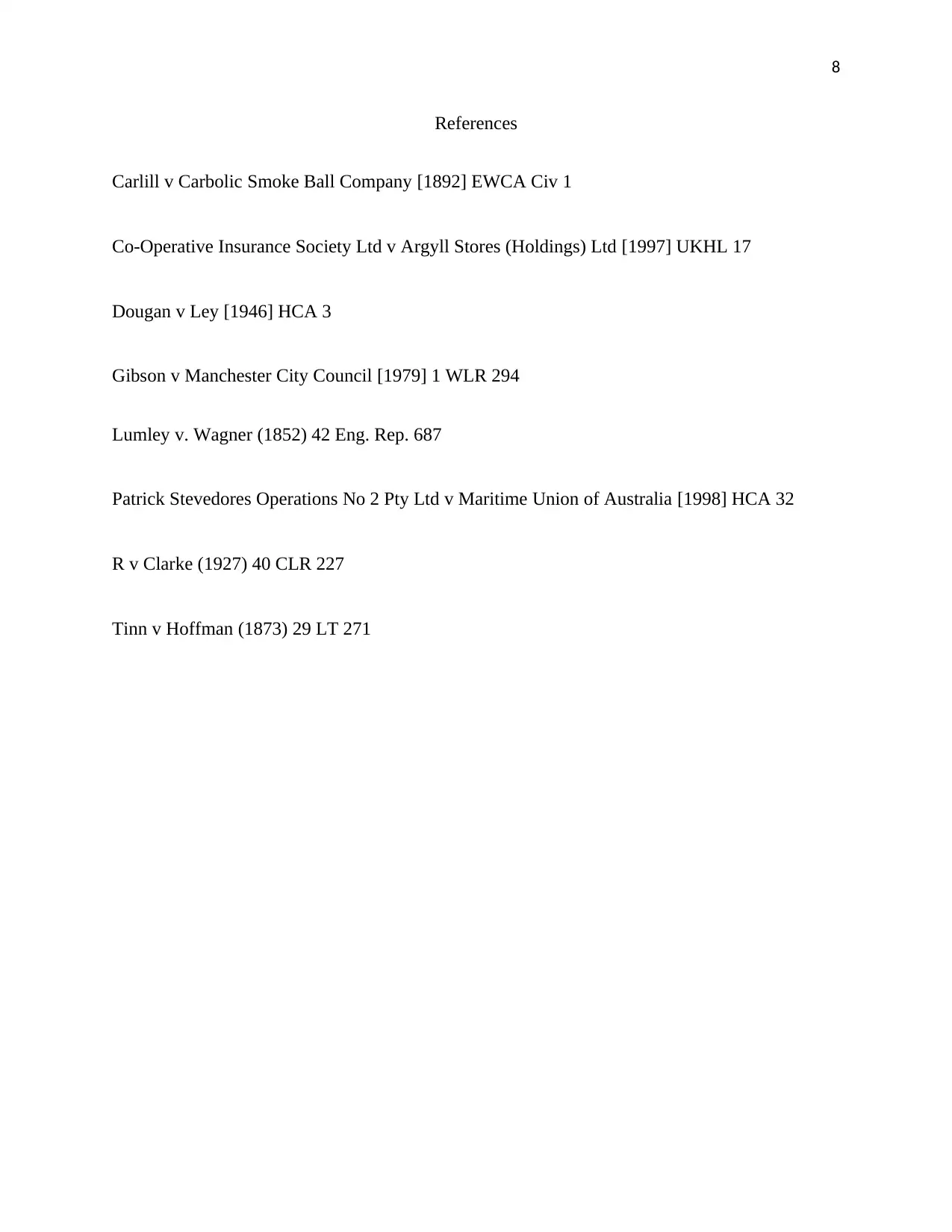
8
References
Carlill v Carbolic Smoke Ball Company [1892] EWCA Civ 1
Co-Operative Insurance Society Ltd v Argyll Stores (Holdings) Ltd [1997] UKHL 17
Dougan v Ley [1946] HCA 3
Gibson v Manchester City Council [1979] 1 WLR 294
Lumley v. Wagner (1852) 42 Eng. Rep. 687
Patrick Stevedores Operations No 2 Pty Ltd v Maritime Union of Australia [1998] HCA 32
R v Clarke (1927) 40 CLR 227
Tinn v Hoffman (1873) 29 LT 271
References
Carlill v Carbolic Smoke Ball Company [1892] EWCA Civ 1
Co-Operative Insurance Society Ltd v Argyll Stores (Holdings) Ltd [1997] UKHL 17
Dougan v Ley [1946] HCA 3
Gibson v Manchester City Council [1979] 1 WLR 294
Lumley v. Wagner (1852) 42 Eng. Rep. 687
Patrick Stevedores Operations No 2 Pty Ltd v Maritime Union of Australia [1998] HCA 32
R v Clarke (1927) 40 CLR 227
Tinn v Hoffman (1873) 29 LT 271
1 out of 8
Related Documents
Your All-in-One AI-Powered Toolkit for Academic Success.
+13062052269
info@desklib.com
Available 24*7 on WhatsApp / Email
![[object Object]](/_next/static/media/star-bottom.7253800d.svg)
Unlock your academic potential
Copyright © 2020–2025 A2Z Services. All Rights Reserved. Developed and managed by ZUCOL.




